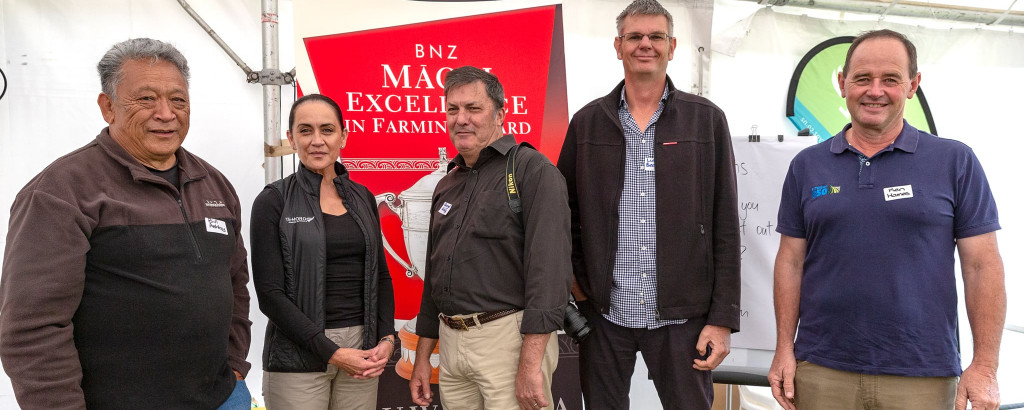Farm setting for successful Extension 350 hui

The successes and challenges facing Māori farming businesses today and in the future were well aired when around 85 farmers, trustees and agribusiness professionals recently gathered for a hui aimed at Māori in the agricultural sector.
The event at Rangihamama dairy farm near Kaikohe was part of Extension 350 (E350), a Northland initiative based on farmer to farmer learning aimed at lifting farm profitability, environmental sustainability and farmer wellbeing.
Project lead Luke Beehre says the project focuses squarely on the farmer. “It’s farmer-led, farmer focused and the farmers learn from, and teach, each other,” he says. “It’s attractive to all farmers, not just those who have been farming for years.”
Inspiring guest speakers at the hui provided ideas and tools for owners, workers and trustees/shareholders to use to help their businesses to succeed, best utilise their land and provide for their whanau.
Host for the day and chair of the Rangihamama Omāpere Trust, Sonny Tau, opened the day by challenging those present to think differently, take advice, consider their options including diversification away from traditional sheep, beef and dairy farming, and “to find your own pathway forward.”
Key note speaker Traci Houpapa, named one of the top 10 most influential women in New Zealand agribusiness, said: “I believe firmly that Māori have a significant contribution to play in terms of the strategic direction and economic wealth of New Zealand. We are heavily invested in people and in our land.”
A variety of guest speakers offered information and advice during the day, including Bruce Cutforth, dairy farmer, industry leader and Rangihamama Omāpere trustee for 11 years.
Mr Cutforth talked about the keys to the success of the trust’s two farms – clarity of purpose and ensuring that the organisational structure of the Trust is robust and able to deliver. “We started with a new vision: ‘That the land will sustain its people’,” he said. “This gave the trustees energy and authority and a strategic plan bought-into by shareholders empowered the board to dream.”
Attention to governance created clear and strategic delegated authorities, defined the roles of governance and management and developed key accountabilities, Mr Cutforth said. “This carried the vision forward, always making sure the whenua was not put at risk.”
Tiaki Hunia, Fonterra’s General Manager, Māori Strategy/Pauhere Māori, said the biggest challenges facing Māori were “not access to capital, but building partnerships and developing confidence. “The kumara does need to talk of its sweetness,” he said in a twist on the usual proverb. “Māori have to tell stories of their success because this will generate more success.”
BNZ partner Sam Johnson, past judge for the Ahuwhenua trophy for Māori excellence in farming said the characteristics common to successful trusts and incorporations included clear direction, sound processes and good governance.
Successful candidates know the importance of fiscal responsibility, on having budgets completed and reviewed,” he said. “Trustees make good use of independent expert advice to instil confidence among shareholders. They use social media well and have a really good way of sharing a story and communicating regularly and clearly.”
Ben Dalton, Northland’s Senior Regional Official – Provincial Development Unit, MBIE, spoke about aspects of land tenure that are inhibiting development and the importance of water storage. There was also vigorous discussion around water usage during the afternoon panel discussion session.
Feedback from the day was very positive with many people saying they had gained new knowledge from the hui. “It was inspirational and it will help us farm our land better,” said one participant, while another said the hui had helped him “meet people who can make things happen.”
E350 farmer chair Ken Hames and project lead Luke Beehre discussed the project’s vision and the opportunities it presents for Northland farmers.
“E350 is a successful programme offering expertise, mentoring and business advice that all Northland farmers can access to make their businesses more successful. It has the potential to transform our agricultural sector and we hope this hui will encourage more Māori to join Extension 350.”
The Extension 350 project, which started two years’ ago, has mentor farmers, associate farmers and farm advisors working alongside target farmers to improve their farm businesses, environmental sustainability & wellbeing. There are 10 regional clusters, each of which has five target farmers who work one-on-one with a mentor farmer and a farm advisor. Five associate farmers are invited to learn alongside each target farm.
Seven of these clusters are up and running now with another three under development. E350 will ultimately involve 350 Northland farmers over five years.
E350 is now looking for mentors, targets and associates for the final three dairy clusters in Northland – Dargaville/West Coast, Bay of Islands and southern Northland and also for associate farmers across the balance of the region.
Anyone with an interest in the programme should contact Luke Beehre luke.beehre@northlandnz.com
"